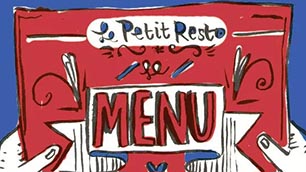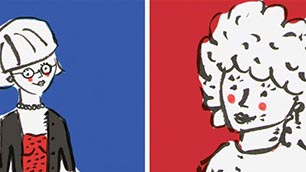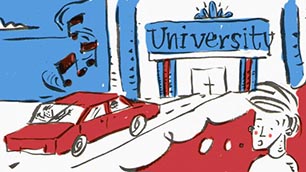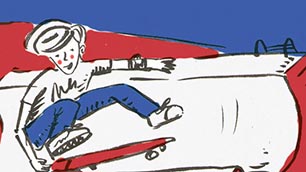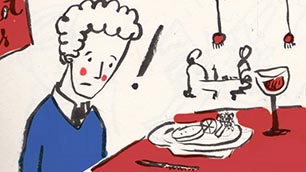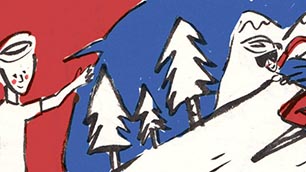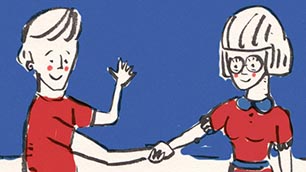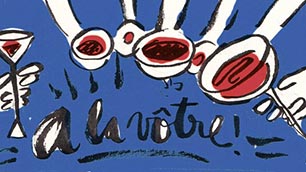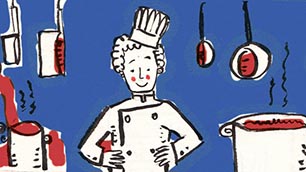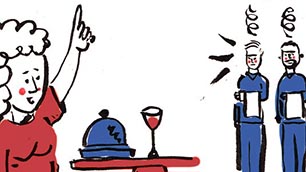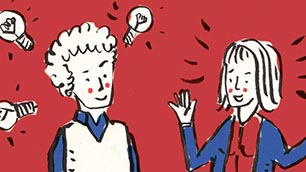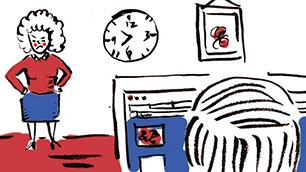| Valérie: | Now that we’ve already covered avoir au présent, I’d like to talk more about avoir in the negative form as well as the idiomatic expressions you can form with avoir. Those are really useful, but they can be a bit confusing because of the English. In English, for example, we say “I am hungry” using to be or être. In French, we say “I have hunger” or j’ai faim. It’s the same for “I am thirsty”. In French, “I have thirst” ou j’ai soif. |
| Jack: | It’s also the same for “I am hot” and “I am cold”, right? J’ai chaud, j’ai froid. |
| Valérie: | Vous avez raison Jacques ! This one too, “you are right” is “you have right” in French. Vous avez raison or... |
| Jack: | My 3 favorite words: vous avez raison or tu as raison. |
| Valérie: | Let’s practice our 8 idiomatic expressions. Which ones haven’t we mentioned? |
| Jack: | J’ai besoin de, j’ai peur de. They mean “I need” and “I’m scared of”. |
| Valérie: | C’est bien. And one last one Jacques. |
| Jack: | Ok, ok, j’ai tort. |
| Valérie: | There it is! Voilà, bravo ! And that means? |
| Jack: | I am wrong. |
| Valérie: | Vous avez raison Jacques. Now, just briefly remind me how to form the negative for verbs in French. |
| Jack: | You need 2 words: ne and pas. |
| Valérie: | And where do you place them? |
| Jack: | Ne goes before the verb and pas right after. |
| Valérie: | Could you give me an example with avoir ? |
| Jack: | Oui, elle a would become elle n’a pas in the negative form. |
| Valérie: | What would j’ai be in the negative? |
| Jack: | Je n’ai pas ? |
| Valérie: | Très bien, you didn’t forget to change ne into n’. How about you say avoir in the negative form for me? |
| Jack: | Ok, je n’ai pas, tu n’as pas, il n’a pas, elle n’a pas, nous n’avons pas, vous n’avez pas, ils n’ont pas, elles n’ont pas. Voilà ! |
| Valérie: | Very impressive Jacques! Let’s speak French now! |
| Jack: | J’ai faim ! |
| Valérie: | That’s right, you didn’t eat breakfast. |
| Jack: | J’ai envie d’un croissant ! |
| Valérie: | Hmm, vous avez raison, there’s nothing like a good buttery croissant. |
| Jack: | You too, tu as faim ? |
| Valérie: | Non Jacques, je n’ai pas faim. But, don’t forget to use vous when you address me. |
| Jack: | Oui, pardon. Vous avez soif ? |
| Valérie: | Oui, un peu. |
| Jack: | Vous avez besoin d’un café ? |
| Valérie: | Oui, avec plaisir. |
| Jack: | Me, j’ai besoin d’un café to wake up! |
| Valérie: | Let’s practice with il and elle, d’accord ? |
| Jack: | Il a peur de la réunion avec les investisseurs. Il a besoin de respirer. Il a une bonne idée. Il est capable to convince les investisseurs. Il est déterminé. |
| Valérie: | Jacques, now please use le verbe avoir. |
| Jack: | Elle a raison. Elle a de la patience avec Jack. |
| Valérie: | Très bien. Now, let’s do nous et vous. |
| Jack: | Nous avons une leçon de français this morning. Vous n’avez pas leçon every day. |
| Valérie: | Bien, ils et elles maintenant. |
| Jack: | Ils n’ont pas envie de listen to my ideas. Ils n’ont pas creativity, ils n’ont pas inspiration. Ils ont obsession for numbers and profit. |
| Valérie: | Are we back to the investors Jacques ? |
| Jack: | Oui, they inspire me today. |
| Valérie: | They are helping you through this lesson! Ils ont de l’influence sur vous ! |
| Jack: | I depend on them for my project; that’s why I can’t get my mind off this meeting. It stresses me out more than I thought it would. |
| Valérie: | Don’t worry, Jacques! You’re very resourceful; I’m sure you’ll find a way to convince them. |
| Jack: | Merci Valérie ! |




